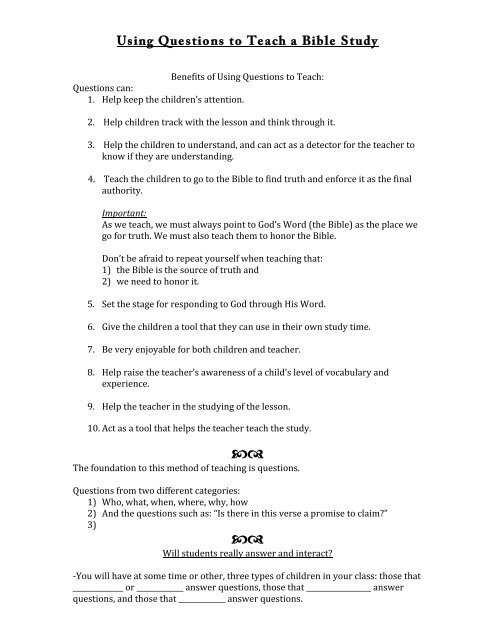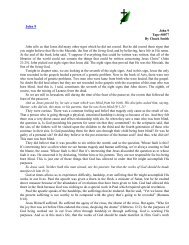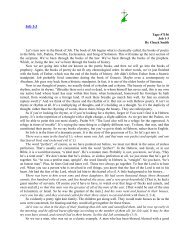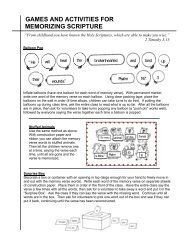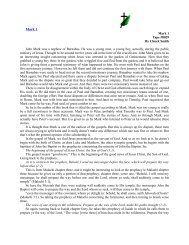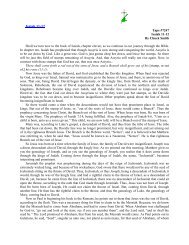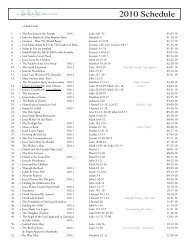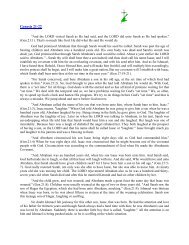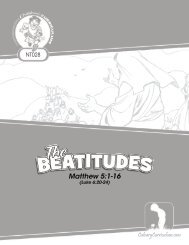Using Questions to Teach a Bible Study - Calvary Curriculum
Using Questions to Teach a Bible Study - Calvary Curriculum
Using Questions to Teach a Bible Study - Calvary Curriculum
Create successful ePaper yourself
Turn your PDF publications into a flip-book with our unique Google optimized e-Paper software.
<strong>Using</strong> <strong>Questions</strong> <strong>to</strong> <strong>Teach</strong> a <strong>Bible</strong> <strong>Study</strong>Benefits of <strong>Using</strong> <strong>Questions</strong> <strong>to</strong> <strong>Teach</strong>: <strong>Questions</strong> can: 1. Help keep the children’s attention. 2. Help children track with the lesson and think through it. 3. Help the children <strong>to</strong> understand, and can act as a detec<strong>to</strong>r for the teacher <strong>to</strong> know if they are understanding. 4. <strong>Teach</strong> the children <strong>to</strong> go <strong>to</strong> the <strong>Bible</strong> <strong>to</strong> find truth and enforce it as the final authority. Important: As we teach, we must always point <strong>to</strong> God’s Word (the <strong>Bible</strong>) as the place we go for truth. We must also teach them <strong>to</strong> honor the <strong>Bible</strong>. Don’t be afraid <strong>to</strong> repeat yourself when teaching that: 1) the <strong>Bible</strong> is the source of truth and 2) we need <strong>to</strong> honor it. 5. Set the stage for responding <strong>to</strong> God through His Word. 6. Give the children a <strong>to</strong>ol that they can use in their own study time. 7. Be very enjoyable for both children and teacher. 8. Help raise the teacher’s awareness of a child’s level of vocabulary and experience. 9. Help the teacher in the studying of the lesson. 10. Act as a <strong>to</strong>ol that helps the teacher teach the study. The foundation <strong>to</strong> this method of teaching is questions. <strong>Questions</strong> from two different categories: 1) Who, what, when, where, why, how 2) And the questions such as: “Is there in this verse a promise <strong>to</strong> claim?” 3)Will students really answer and interact? -‐You will have at some time or other, three types of children in your class: those that ______________ or _____________ answer questions, those that __________________ answer questions, and those that _____________ answer questions.
Here are some aspects that will affect the interaction of the students: • What are the students’ personalities? • Are they a child of God? The things of God are spiritually discerned. • Do they feel safe? Can mistakes be made without the danger of being made fun of or put down? • How are you asking the questions? Are they being put on the spot? • Are you encouraging them <strong>to</strong> figure out the answer when they don’t have it immediately? Are you giving them enough time <strong>to</strong> answer? • Do they understand the question and what’s expected from them when answering… such as do they raise their hand or not? You need <strong>to</strong> be clear in your question, and you have <strong>to</strong> train them and tell them what you expect. • Are you encouraging them <strong>to</strong> answer questions and when they do answer questions? Without putting them on the spot! • Are you over-‐explaining things? It’s a fine balance in asking questions and explaining enough. • What part of the <strong>Bible</strong> are you studying? Old or New Testament? Various points on using questions <strong>to</strong> teach: • <strong>Using</strong> questions with “obvious” answers will not waste valuable time. What is “obvious” <strong>to</strong> an adult, is often not obvious <strong>to</strong> a young person. • This method has been used with 1 st – 6 th graders and with groups of three students up <strong>to</strong> groups of thirty students. • If only 1 student will answer your questions, that’s perfectly fine. The other students are listening. • There will be times where the students won’t interact and/or respond <strong>to</strong> God. But you, as the teacher, are still giving them a mindset by asking questions as much as you are able and leading them <strong>to</strong> respond <strong>to</strong> God. • The students need <strong>to</strong> be trained in what is expected of them! (Such as: raising hands, when <strong>to</strong> talk, etc.) • Be careful what questions you choose because questions lead <strong>to</strong> conclusions and emphasis.
• You can still explain things without using questions, as the need arises. There just needs <strong>to</strong> be sensitivity <strong>to</strong> the children <strong>to</strong> keep them from getting in the rut of only listening, as much as is possible. • There are definitely times when you will need <strong>to</strong> give the answers <strong>to</strong> your questions <strong>to</strong> the students. Sometimes they simply can’t figure the answer out, other times they won’t. There are important things <strong>to</strong> remember when studying and teaching: Children lack two things: 1) Experience: thus we need <strong>to</strong> teach in the realm of their experience. 2) Vocabulary: we need <strong>to</strong> teach within their vocabulary, we need <strong>to</strong> use words that they know and understand. This is key: We often don’t teach on their level – because they don’t understand, they don’t track with us or participate. Many times when they are not answering a question it is because they don’t understand – not because they aren’t interested or don’t care. Don’t always assume that they understand your question. <strong>Using</strong> questions as a platform for responding: Our teaching is not more important than the children coming <strong>to</strong> God. Are we teaching the children <strong>to</strong> search the Scriptures, yet not taking them <strong>to</strong> Jesus? That is hindering a child. Are we teaching them <strong>to</strong> be religious or <strong>to</strong> have a relationship? -‐Interaction during the study time helps create a level of comfort for the students <strong>to</strong> respond <strong>to</strong> God. It creates a natural transition – it moves them from communication with the teacher, answering the teacher, <strong>to</strong> communicating with God, answering God. -‐Just as certain things affect whether the children will answer questions or not, certain things affect whether they will respond <strong>to</strong> God or not. (How do you meet with God if you don’t know Him?) It’s good <strong>to</strong> use questions for other times in the class besides the <strong>Bible</strong> study time. <strong>Questions</strong> build relationships. When you ask questions, it says, “I care about what you think and how you think,” it tells them you care about them. “The teachings of our childhood leave clean-cut and sharp impressions upon the mind, which remain after seventy years have passed. Let us see that such impressions are made for the highest ends.” –C. H. Spurgeon <strong>Using</strong> questions is a skill that gets developed: those who develop it stay at it week after week – they don’t give up – they learn how <strong>to</strong> do it and they get better and better.
Who? Who are the participants, the author, and the intended listeners or first readers? If there is a command – who must obey it? What? What happened or will happen? If there is a command, what should be done? What does the text say about God, Jesus, people, Satan, angels, demons, etc.? What ideas discussed, and what is said about them? When? When did (will) it happen? (Time lines are helpful.) If there is a command, when must it be done? If the text is a prophecy, has it been fulfilled? Where? Where did (will) it happen? (<strong>Bible</strong> maps are helpful.) If there is a command, where must it be performed? Why? Why was (is) this done? Why did (will) this happen? Why should it be done? How? How was (is) it done? How should it be done? When teaching with other questions such as: “Is there a promise <strong>to</strong> claim?” use the “what” question in explaining or asking, what does: “Is there a promise <strong>to</strong> claim” mean? Ask students, do you know what that question means. Explain meaning of question. Is there in these verses a: Promise <strong>to</strong> claim? Sin <strong>to</strong> avoid? Warning <strong>to</strong> heed? Command <strong>to</strong> obey? Good example <strong>to</strong> follow? Bad example <strong>to</strong> shun? New or fresh thought about God the Father? New or fresh thought about God the Son? New or fresh thought about God the Holy Spirit? Fresh insight in<strong>to</strong> the person of Satan? Fresh insight in<strong>to</strong> Satan’s cruel goals? Fresh insight in<strong>to</strong> Satan’s subtle devices?


